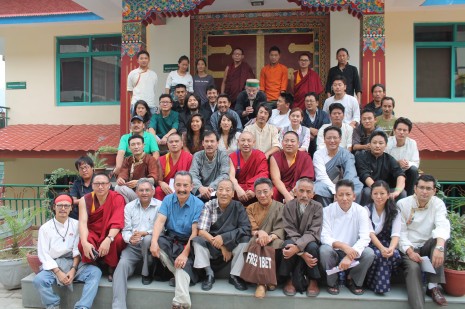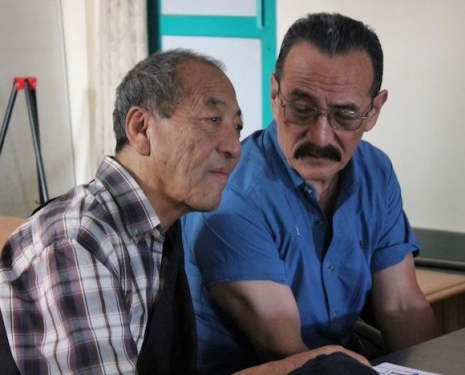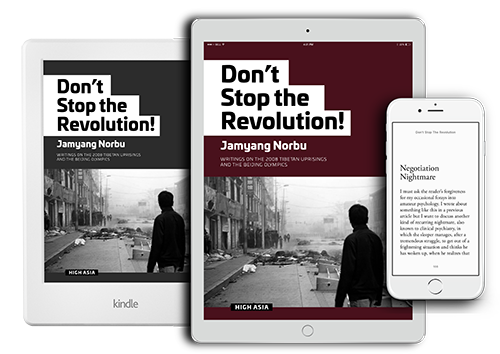I met my old friend Sonam Topgyal la last summer – June 25th to be exact. He was in a bad way. Definitely cancer. I suspected stomach cancer of a kind, but could not bring myself to ask. He was weak from his last chemotherapy, but seemed glad to see me. As always we talked about Tibet and the independence struggle. I told him about the Rangzen Roundtable we had organized in New York City earlier that year (11-12 March) where patriotic Tibetans and friends from USA, Canada, Switzerland, Germany, Japan and India had gathered and committed themselves to starting a new political movement, the Tibetan National Congress (TNC) or Bhod Gyalyong Rangzen Lhentsok. I explained that one of the reasons I was in Dharamshala was to participate in another such Rangzen Meeting where we hoped the TNC South Asia could be established. I asked him if he could attend the meeting. He replied that there was not much he could contribute in his present physical state, but that he would attend if it helped the cause in any way.

I first met him in 1969 at McLeod Ganj – March 5th, if my memory serves me. I had been working the last year at Mundgod for the Swiss Technical Corporation as foreman for the settlement’s tractors, but was requested to come to Dharamshala to help with the new magazine Sheja (Knowledge) published by Tenzin Tethong, Tenzin Gyeche la and Sonam Topgyal la, who served as the chief editor. It was an exciting and novel publication. It not only printed news-reports of current events but also general-knowledge information about science, history and brief bio’s of “great men and women”. It was a conscious attempt to bring about the modernization of Tibetan society and was tremendously popular with the Tibetan public. At that time the memory of our defeat was fresh in the mind of all Tibetans, and there was, even among hardliners on the “religious right”, a conviction that we absolutely had to democratize and modernize our society if we were to survive as a nation. I mentioned this before in some earlier articles comparing the intellectual/ political atmosphere in exile society to that of turn of the century (20th) China with its praise of “Mr Democracy and Mr. Science” (de xiansheng sai xiansheng) that the revolutionary, Chen Duxiu, insisted “were the only two gentlemen who can save China from the political, moral, academic, and intellectual darkness in which it finds itself’.”
For a long time the magazine was mimeographed or cyclostyled (Tib: num-par) with an old calligrapher laboriously hand-cutting the text on a paper stencil, and the “printer” Namgyal Wangdu la turning the crank handle of the Gestetner machine. It was admittedly primitive, but it didn’t matter. Tenzin Tethong produced brilliant artwork, cartoons and maps to accompany the articles written in Topgyal la’s elegant but clear and straightforward Tibetan.
I didn’t stay long at Sheja. TIPA or the the Tibetan Drama Party as it was called then, was going through an existential crisis and I was asked to work on its reorganization. But that is another story. Once a month (or fortnight?) most of us young volunteers or indrungs (English officials) as we were called, would gather at the Sheja office to help staple, pack and post the latest issue. The management would treated all us all to tea and kogun bhaley, but the the real reward was the conversation and jokes, that continued late into the evening.
The next year with the formation of the the Tibetan Youth Congress, I was thrown together much more with Topgyal la. He was one of the founders with Tenzin Tethong, Lodi Gyari, and Tenzin Gyeche, and I was one of the conveners who helped organize the first Congress. Both Topgyal la and I were elected to the Central Executive Committee with five others, and worked together for many years. Topgyal la was older than the rest of us. He was born in Kham Dagyab in 1941 to the Zachutsang family, though he rarely used that family name. He had been a monk at Drepung and later in exile had studied at Varanasi, where he had mastered Hindi among other subjects. He regularly subscribed to the Hindi newspaper Navbharat Times and the weekly literary/political magazine Dinaman, and kept abreast of world news and the twists and turns of Indian politics. I was glad to have Topgyal la in Centrex. I was the youngest member of Centrex and always got into arguments with the others. Topgyal la didn’t always agree with me, but he went out of his way to make sure I got a fair hearing. He was a moderate in most things, and it was his steady influence that helped keep TYC on an even keel, even during turbulent times. Yet sometimes when called for, Topgyal la could be relied on to make the difficult choice and support a difficult decision.
His staff members at Sheja, and later at the Information Department where he became secretary and later Kalon, all knew him as a fair-minded and accessible leader. They and everyone else at Ganchen Kyishong also knew him as the most unassuming and unselfconscious official in the administration. His hair was always mussed up and he could never be bothered to comb down the cowlicks. He was also notorious for coming to office with mismatching (one blue one red) socks, and not being bothered about it. Even as a kalon he would find time for a game of cards with the Gangkyi drivers. I don’t know whether he had to give up that past-time when, after a lifetime of service, he finally got to be prime-minister. I suspect not.
But it was not just his honesty and fairness that made him a good leader. He was someone who always listened to people and who managed to assimilate the information in his work. In a community where most politicians are uninformed and unteachable right-wing gasbags of the Herman Cain variety, his was an unusual virtue. Because he listened, patiently and with real interest to all the newcomers from Tibet, he was the most knowledgeable person in Gangkyi circles on everything that was happening inside the country: administration, party structure, personalities and so on. He was also one person who absolutely knew his history and organization of the Chinese Communist Party.
When he eventually became prime-minister I felt that His Holiness would be well served by Topgyal la’s knowledge and loyalty, but also by his frankness and his ability to “speak truth to power”. Although he served in an administration advocating the Middle Way policy, he never made any statement accepting China’s rule over Tibet, or praised, in any way, China’s “developments” (eg. the railway) as other prime-minsters began to do after him. As prime-minister Topgyal la never once spoke out against rangzen advocates, and in fact encouraged the TYC, myself and other Rangzen activists in our efforts. He was of the belief that the only way to get China to agree to genuine negotiations was through applying pressure, and that all Rangzen advocates were such a source of pressure. I disagreed with him regarding this, but he did have a point. Eventually after the failures of the negotiations, Topgyal la came out and stated publicly that Tibetan should never give up the goal of independence. He repeated this belief in a number of discussions on RFA in which I participated. He was a loyal government official but he was also honest and courageous. A few days before he died, a mutual friend of ours went to see him at his house at Sidhbari. Topgyal la told him that he was suffering a great deal of pain, but that he was not afraid to die. He passed away on the 30th of December 2012.
* The flaming sword of Manjushri (Bodhisattva of Transcendent Wisdom) that cuts through the chains of ignorance, apathy and fear – liberating all beings.




Thank you Jamyang Norbu-la for this beautiful piece of this very endearing son of Tibet. Wish we had more people like him instead of the trophy-wife type we have now.
Like the author of the obituary, the late Kasur Sonam Topgyal’s views were aired during his over decade-long consultancy at RFA’s Tibetan Service.In the process the people of Tibet learned a lot about the leadership qualities of Sonam Topgyal as a unabashed Rangzen advocate at core. After his retirement, he fearly voiced his concern about CTA’s dealing with China, and hoped against hope for some much needed policy changes in dealing with Beijing. While, he pinned his hope in the younger generation, he dared to openly refused to endorse Sidyong Lobsang Sangay, who visited him to seek his support. The late Kasur flatly rejected the request. He reported told him that “you have a great future, but right now, it is a bit too early. A year later, we can judge his judgement.
SWNY
Location: New York
Subject: Condolence to Kalon Trisur Sonam Togyal la
Jan 05 2013 03:44 AM
I offer my deep condolences to Kalon Trisur Sonam Topgyal la’s family, relatives and friends. I remember well how highly the late Kungno Tsepon W.D. Shakabpa, author of Tibetan Political History, regarded Trisur Sonam Topgyal la. At the request of His Holiness, Kungo Shakabpa instructed TGIE staff members in Tibetan history in Dharamsala, in the early 1980s, and the late Trisur Topgyal-la was one of his students. Kungo Shakabpa saw Topgyal-la as a man of high intelligence, integrity and firm commitment to serve the cause of Tibet and the Tibetan people. Kungo Tsepon took great comfort knowing that there were young, energetic and dedicated civil servants such as Topgyal la.
Trisur Topgyal-la inspired young and old with his firm and unwavering stand for Rangzen even when the stance for Rangzen came under attack. It takes the strength of character and courage to be able to stand firm for one’s belief and to protect the truth. He will be greatly missed by those who stood with him, and his inspiration and his commitment to restore Tibet’s sovereignty will never fade away. It will grow stronger with every new generation who believe in truth of Tibet and the rights of the Tibetan people to be master of their nation again.
The late Senator Ted Kennedy’s sentiments accurately captures Kalon Topgyal la’s legacy, “The work must go on, the cause endures, the hope still lives and the dream shall never die.”
Sonam Wangdu
New York
Thank you for this wonderful write-up. It sounds like Sonam la was a man of true virtue. The loss of such a person is always difficult to bear. Perhaps that loss will be a bit less severe if more Tibetans embody the admirable virtues of Sonam Tobgyal la. If Sonam Tobgyal la’s virtues were widely emulated, would that not honor him the most, as he would live on amongst those who struggle for freedom?
Such moving thoughts on such gracious person I have known our late Prime Minister Tobgyal la. I had the privilege to work with you and Tobgyal la four wonderful years in the Centrex TYC back in 70s.You have described his thoughts and his great services to our people so well. Thank you Jamyang la. He will be missed the Prime minister who strongly believed in Rangzen.
Thanks! A very touching & insightful. Helps inspire me to carry-on, to fight the fight for our independence & freedom. We all will die one day but it’s what one does in life to make a difference that matters most to me. RANGZEN!
I had the great fortune of working under Kasur Sonam Tobgyal la when he was the General Secretary for the department of information in the early Seventies in Dharamsala. As my boss I always found him to be smiling and good natured no matter what the situation may be. He treated even the lowest of us like equals and never heard a harsh word uttered during my time. He chose his words carefully and between the clouds of blue cigarette smoke and morning staff tea break, his words were always positive and encouraging. In some ways he reminded me of “George Smiley”; john le Carrie’s fictional character. And I have no doubt that his name should be entered into the roster of Tibetan exiled heroes. May the blessing of Lord Buddha guide his soul swiftly to a better world!
Dear Jamyang Norbu la,
Thank you for the affecting account of a great Tibetan patriot. If you have a moment, could you expand on what you meant by the following, quoted from the article? Thank you.
“He was of the belief that the only way to get China to agree to genuine negotiations was through applying pressure, and that all Rangzen advocates were such a source of pressure. I disagreed with him regarding this, but he did have a point.”
Thank you Jamyang la for sharing biography of late kasur sonam topgyal la……..May he be born again as a tibetan and my deep condolences to his family and relatives….
Hi,
I have a quick question about your blog, would you mind emailing me when you get a chance?
Thanks,
Cameron
cameronvsj(at)gmail.com
Thank you Jamyang Norbula .My father Sonam Topgyal Zachutsang was most precious to our family He was the great father and great patriot .Thank you for honoring my father memory.Thank you for loving memories shared with us .
Jamyang Norbu la,
Thank you so much for this wonderful write up on a wonderful human being.I know him through his daughter, Namgyal. From the few times I had met him, I found him very unassuming,down to earth and a cheerful.When I visited him in the hospital in Delhi he was very cheerful then also.
May God bless his kind soul and give courage to his family to bear this irreparable loss.
Here is the Tibtan translation of this article, which I found from khandha.org website.
http://www.khabdha.org/?p=41532
Touching story. On a partially related note: unfortunately too many tibetans are affected by stomach and liver cancer, as are most asians, due to genetical weaknesses ocurring in many individuals, regardless of lifestyle.
Having lost already a family member, witnessed friends and acquaintances suffering of such diseases (hepatitis B, turning to liver cancer, and stomach due to weakness for a common stomach bacteria), and now my own father struggling against it, i feel like sharing the information i gathered because it could help reduce these endemic diseases among the community.
I have been for years researching about it reading thousands of medical research publications, validating them with friends who are cancer experts, biologiy researchers and physicists. There are ways to PREVENT those diseases. For liver: reishi mushrooms, or Ganoderma Lucidum (scientifical names). Ironically the most precious chinese medicine for thousands of years. Which best quality was found according to chinese scholars in the woods of Tibet, Kham and Amdo. All academical research are available on scholar.google.com
For stomach, and even other types of cancers: mangosteen fruit (especially the pericarp).
As preventive complementaries, these can save lives, and add many years. And it s better to prevent the fire than to fight it, as i am unfortunately doing right now..
very beautifully written article or experience, i hardly know tibetan administrators, i think i will read more of your article to know the names and the functions our tibetan government in exile does. thank you jamyang norbu la